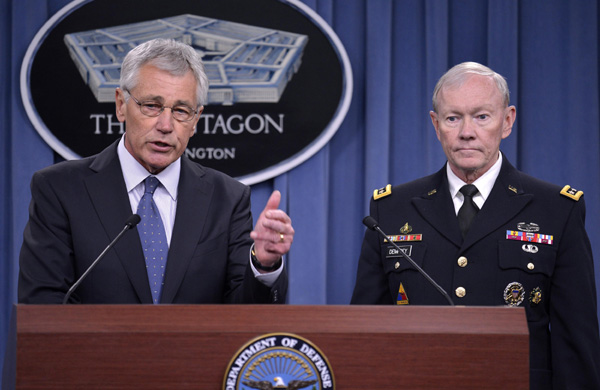 |
|
US Secretary of Defense Chuck Hagel (L) makes remarks to the press as Chairman of the Joint Chiefs of Staff General Martin Dempsey listens at the Pentagon, Arlington, Virginia, February 24, 2014. [Photo/Agencies] |
WASHINGTON - US Defense Secretary Chuck Hagel outlined on Monday his priorities for 2015 defense budget cut, including plans to reduce the size of the US army to its pre-World War II levels.
"We are repositioning to focus on the strategic challenges and opportunities that will define our future: new technologies, new centers of power and a world that is growing more volatile, more unpredictable and in some instances more threatening to the United States," Hagel said at a Pentagon press conference.
The Pentagon chief unveiled his budget-cut proposals as the Obama administration is preparing to pull out most US troops from Afghanistan following an almost 13-year war.
"As we end our combat mission in Afghanistan, this will be the first budget to fully reflect the transition DOD (the Department of Defense) is making after 13 years of war, the longest conflict in our nation's history," said Hagel.
Among the proposals, Hagel announced his plans to further reduce the size of US Army to between 440,000 to 450,000 active- duty soldiers. This would mark the US Army's smallest force since World War II. The active-duty troop level has already been slated to go down to 490,000 by 2015 from a peak of 570,000 after September 11 attacks, 2001.
Hagel's proposals also include to retire the US Air Force's entire A-10 fleet and to seek another round of base realignment and closure.
Hagel said the recommendations favor "a smaller and more capable force, putting a premium on rapidly deployable, self- sustaining platforms that can defeat more technologically advanced adversaries."
"They're also well-suited to the strategy's rebalance to the Asia-Pacific region, to sustaining security commitments in the Middle East and Europe, and our engagement in other regions," he added.